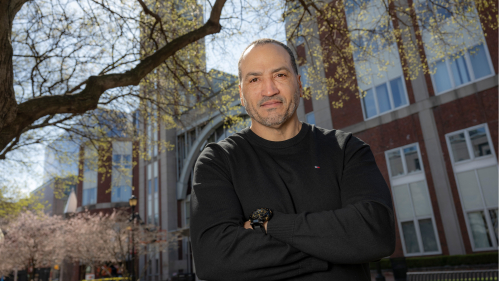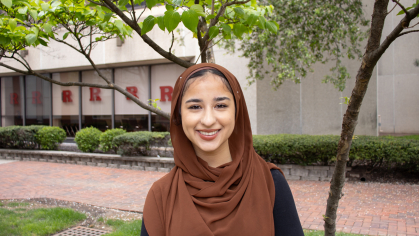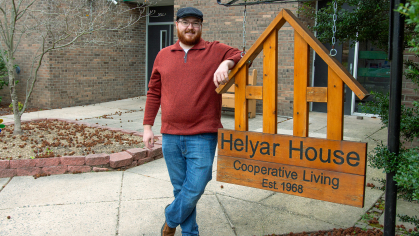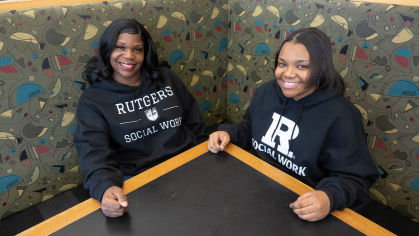Formerly Incarcerated Student Earns Degree While Building Career as Anti-Eviction Advocate

Efren Mercado began serving time in 1993 on a felony murder charge for his role in a robbery that went horribly wrong – a scared kid of 17, barely speaking English, separated from his family for the first time and looking at an uncertain future.
He walked out a free man 30 years later, not only ready to receive his bachelor’s degree in justice studies from the School of Criminal Justice at Rutgers University-Newark this May, but also employed full-time helping families facing the threat of eviction.
Mercado earned the bulk of credits for that degree while still behind bars, thanks in large part to a statewide program Rutgers helped establish called NJ-STEP or New Jersey’s Scholarship and Transformative Education in Prisons – a consortium serving students attending colleges in the state’s prison system.
“Efren’s was definitely a different college experience,” says Christopher J. Agans, NJ-STEP executive director.
“Different” may be a classic understatement, Mercado acknowledges.
“Just imagine me in my 40s, hunched over a bed full of papers for hours, til 8, 9, 10 at night doing research in my cell. No typewriters, no word processor, no laptop. There was no space on the twin bed – it was full of articles, books, papers, erasers.
“I was in my element,” the Newark resident says.

His parents brought Mercado from their native Puerto Rico to Lakewood when he was 13. He made it to ninth grade before dropping out, bored with the idea of sitting in school and listening to teachers.
“I was an ignorant kid who just didn’t want to learn,” he says.
Then came the robbery that changed the trajectory of Mercado’s life.
“I was not the trigger guy. I did not take a life,” he says now. “I never had a gun. But I did make some bad choices.”
The charge was felony murder, which carries a mandatory prison sentence of 30 years. Mercado would remain behind bars from 1993 to 2023, ultimately landing in half a dozen of the state’s correctional facilities and prisons before being released to a Kintock Halfway House in Newark.
During his stay at East Jersey State Prison in Rahway in 2013, he took the first steps in his journey into higher education, becoming one of the first incarcerated people to sign up for what was then a new program.
“I knew that one day I was going to have an opportunity to prove to others that prison doesn’t define who I am,” Mercado says of his eagerness to enroll in the program. “I couldn’t let an opportunity for a free education go to waste.
“I wanted to rewrite my story and change the narrative.”
He began with a math course, he remembers, followed by intro to sociology. He couldn’t get enough.
“I love learning, enriching myself,” Mercado says. “I had to learn how to do the basic stuff: how to write a paper, for example. One of the biggest challenges was research. We had no library, no technology, so I had to think outside the box. We’d ask the professor how to get articles about a particular subject, and he’d bring in articles for us to use.”
Other prisoners, many of them participants in the NJ-STEP program, were supportive, helping each other with a math problem here, a gracefully written paragraph there.
Classes took place in the prison’s Incarcerated Person Program Center, a room large enough to hold only 21 students and one professor at a given time. Mercado estimates that about 100 prisoners took part in the program while he was pursuing his degree.
“We all sat at a single desk, much like those from 1980,” Mercado says. “The only things we would have on our desk were the course reading material and a composition book to keep our notes. Old school!”
He earned his associate degree in liberal arts from Mercer County College first, then continued on for his bachelor’s degree from Rutgers, pursuing his studies at Rutgers-Newark once he was released to the halfway house.
On May 15, Mercado plans to walk with fellow students to claim that degree. His mother, Iris Dueno, will be among the spectators.
More than 2,000 students have taken classes in the state’s prison through Rutgers’ participation in the NJ-STEP program, executive director Agans says, and almost 200 have gone on to graduate with a Rutgers degree.”
In addition to working with Rutgers at Newark and Camden, NJ-STEP partners with seven colleges and universities in the Garden State, including Raritan Valley Community College and Princeton University.
Mercado now works full time for the non-profit Newark Community Solutions, a branch of the Center for Justice Initiatives in Manhattan. He helps families on the verge of eviction find resources to keep their lives together – a job that brings him enormous satisfaction, he says.
“I help do intake, screen people for funding. For me, this is a career, not just a paycheck. I’m helping people in my community – what could be better?” he asks.
He also coordinates outreach events to spread the word about the services his agency provides.
“He’s an extremely thoughtful, appreciative, giving, sharing kind of guy,” Agan says. “Although he’s moving on, we still lean on him as a public speaker, as an advocate, someone to meet with our program’s partners and allies.”


